I WANT MY GRANDCHILDREN TO HAVE A VOICE IN THEIR FUTURE Organiser Michele shares her hopes for the Yes vote
THE GREATEST ACT OF OPTIMISM
New educator Emma on the triumphs and challenges of country education
SUPPORTING OUR SUPPORT STAFF
Let's demand support staff are valued in tangible ways
FREE FOR AEU MEMBERS
Journal
AEU SA VOL 55 | #3 | JULY 2023
Free


advice on real estate queries. If you are buying or selling or are involved in any real estate matter, either through a land agent or privately, consult us.









unionlegalsa com au enquiry@unionlegalsa com au 08 8334 1981 Our Services include: Employment disputes and disciplinary matters Wills and other testamentary documents Probate and Letters of Administration Protection you deserve UNION LEGAL SA Exclusive and preferential rates available for AEU members Conveyancing Worker's Compensation Personal Injury Traffic and Criminal Offences Family Law Let our experience work for you Call us today on 8334 1981 to book a free first interview with one of our solicitors > Sale and Purchase of Residential Property > Preparation of Form 1s > Family Transfers > Private Contracts > Documentation for Private Mortgages > Applications to Register Death > Land Divisions
Change of Name Applications
ORDER ONLINE 24/7 Register for online access to The Good Guys Commercial website at: www.unionshopper.com.au/the-good-guys TALK TO A REAL PERSON Phone our Call Centre on: 1300 368 117 GREAT DEALS FOR MEMBERS AT THE GOOD GUYS As a valued Union Shopper member you can now get access to member pricing via The Good Guys Commercial website. You will be able to see ‘live’ discounted pricing on The Good Guys range – that’s great deals on thousands of products! And you will be able to make your purchases online –saving you time and money.
campaign updates valuing you creative thinking AEU SA Fuel your passion for early years education by connecting with educators. We'll be focusing on: Wednesday 4 October 2023 9:15 am - 3:30 pm AEU conference facilities Free for AEU members See the full program and register at aeusa.asn.au/upcoming
>
expert
Early Childhood Conference
What’s in this
the Australian Education Union (SA Branch). Disclaimer: AEU SA has done its best to ensure that all information provided was accurate at the time of printing.
Australian Education Union (SA Branch) acknowledges the Aboriginal and Torres Strait Islander peoples as the first inhabitants of the nation and the traditional custodians of the lands where we live, learn and work.
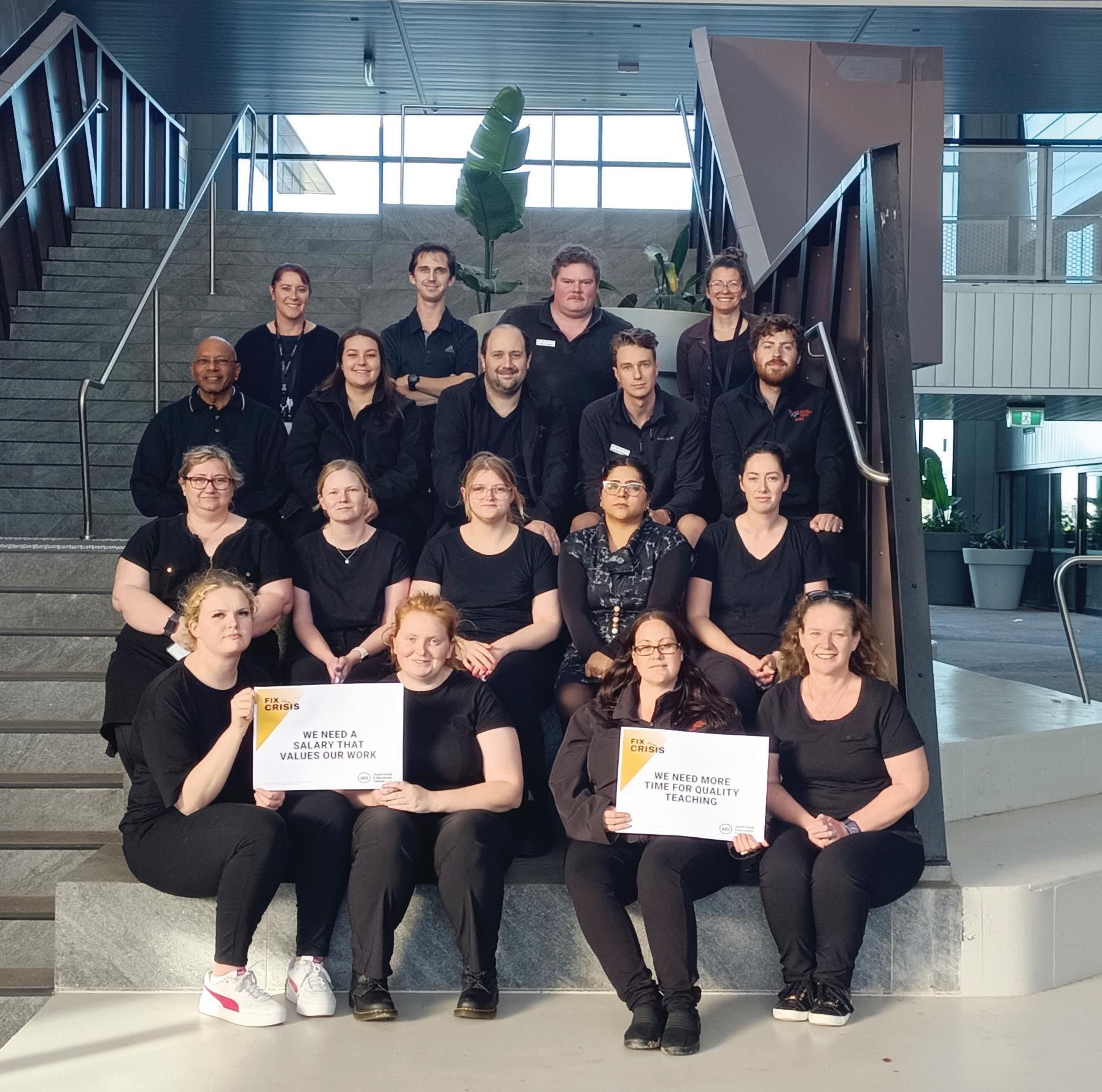
Kaurna Country, 163 Greenhill Road, Parkside SA 5063 08 8172 6300
23 “IT HAS BEEN LIFE-CHANGING!” Get to know our Anna Stewart Memorial Project participants
25 WHEN IN DOUBT, TALK IT OUT Advice from our legal eagles, Mika and Cecilia
26 THE RIGHT TO DISCONNECT
28 MEET THE COMMS TEAM
29 BRAIN BREAKS
30 PROFESSIONAL LEARNING
MATTHEW CHERRY ELECTED AS NEW AEU SA BRANCH SECRETARY
A member-wide ballot was conducted between 7 June and 5 July by the Australian Electoral Commission for the election of the AEU SA Branch Secretary. Congratulations to Matthew Cherry, our new AEU SA Branch Secretary! Watch out for a feature interview with Matthew in the term four Journal.

Editor: Seren Bell | Design: Rachael Sharman
Printer: Lane Print | PrintPost approved: PP 100000753
Print: ISSN 1440-2971 | Digital: ISSN 2207-9092
AEU SA Journal is free to AEU members Non-members subscription rate: $33 per annum
AEU SA Journal | 5 04 rning the joy to our work icturedabove:Whyalla Secondar y School 04 RETURNING THE JOY TO OUR WORK AEU President Andrew Gohl on how we reclaim balance and joy in our profession 06 USE YOUR VOICE TO MAKE HISTORY How to be an effective advocate for the Yes to Voice campaign 08 WHY I’M VOTING YES Hear from our members on what the Yes vote means to them 10 I WANT MY GRANDCHILDREN TO HAVE A VOICE IN THEIR FUTURE Michele Appleton knows a Yes vote means a brighter future for the next generation 11 SPEND THE DAY WITH ME: AEU SA RECONCILIATION CONFERENCE With AEU member Sarah Finney 12 SUPPORTING OUR SUPPORT STAFF 14 A PASSIONATE COUNTRY EDUCATORS ROUNDTABLE 15 THE GREATEST ACT OF OPTIMISM A new educator on the joys and challenges of teaching in the country 16 TERM 3 PLANNER Pull-out planner with all this term's essentials 18 WORKLOAD WEIGHS HEAVY ON TAFE MEMBERS 20 SPORTS DAY SHOULD BE FUN FOR EVERYONE! Making sports day welcoming for gender-diverse students 21 BAND B SALARIES MUST BE A CRITICAL ISSUE IN EB NEGOTIATIONS By AEU member Brett Ferris 22 IT’S NOT ENOUGH TO JUST REACT What new sexual harassment laws mean for educators
issue? The AEU SA Journal is the official publication of
aeusa.asn.au
Journal@aeusa.asn.au
Returning the joy to our work
We’ve spent more than six months bargaining. Our platform has developed to reflect broad member consultation and research, yet the Government has refused both our requests for an interim pay increase and for a first offer. Educators are tired. You continue to be stretched thin, the cost of living grows, and every day the Government delays, more educators reach breaking point.
The teacher shortage crisis remains the focal point of our campaign. Why is it that one in two teachers plan to leave teaching in five years? The answer is simple and supported by research: there is no joy in teaching. If joy in teaching is a bar too high, consider that our research identified that only 52.9% of SA educators said they were satisfied with the job, compared with a national figure of 90%.
Our vocation has become dominated by a Departmental focus on data collection and administrivia, little of which contributes to teaching and learning. Non-Instruction Time is consumed by these central demands for data, so teachers are forced to take marking, assessment, and reporting tasks home. Support staff are under increased pressure to work outside of hours, through breaks, and beyond their role to keep our system running, yet are less tangibly valued by the Department than ever before. This amounts to exploiting the profession’s unpaid goodwill, knowing that educators will always put students first, at the cost of time with families and wellbeing. And it is destroying our profession.
What you need to know
+ The Government has refused our requests for an interim pay increase during bargaining and has failed to make a first offer by our deadline
+ We must take control of our workloads and highlight the thousands of hours of unpaid work educators are doing every year
+ Let’s Focus on Teaching and Learning this term. Chat with your subbranch about what this looks like at your site.
Our platform
Our platform is clear, based on research and member feedback, and spells out clearly a solution to fix the crisis.
+ More Non-Instruction Time Data reporting, administration and “quality differentiated learning” signal a pedagogical shift, yet NIT has not increased in years. It’s time to change that
+ An SSO in every class Student complexity has reached levels our system cannot manage. Additional support in the classroom has never been so important
+ Improved Country Conditions Governments have a social obligation to ensure every child has access to quality educators. Higher incentives and improved housing will help us attract them
+ A salary that values educators
Cost of living continues to grow, and educators are hurting. We must ease this pressure and remain competitive with other states to keep teachers in SA.
If you’re still familiarising yourself with our platform, you can head to our website and download our Campaign Pack to read about our plans in detail.
If not now, when?
Years of Government neglect has pushed our system to breaking point, but rhetoric at State and Federal levels has shifted recently. Jason Clare and Blair Boyer, the Federal and State Ministers for Education, have both acknowledged our excessive workloads, and Clare recognises the teacher shortage crisis, so well disguised by educators papering over the cracks. Parents gained a new appreciation of the pressures we face during COVID. Our historically hostile media has begun to acknowledge the crisis and express support for public education. We have never seen such a convergence of favourable opinions.
I know our profession is fatigued, but now is the time for us to push hard to address the crisis once and for all. At this stage of the campaign, some will feel we are not doing enough while others will be reluctant to act. Union power does not come from a strongly worded letter. It comes directly from you, our members, showing the Government they can’t take you for granted. If members cannot stand together and demand respect, then what we achieve through negotiation will fall short. That is the reality.
FROM THE PRESIDENT: EB UPDATE
AEU SA Journal | 3
Take control of your workload: Focus on Teaching and Learning
This term we will increase collective pressure. If the Government and the Department will not address our workload concerns, then we must take control of our working lives. Our Focus on Teaching and Learning is the first of a suite of escalating actions. We’re asking members to identify and cease at least three things that consume their time and detract from the value of teaching and learning.
Our Focus on Teaching and Learning Action Pack has been distributed to help frame this action and equip you with the resources needed to effectively manage this action. You can find it in your inbox or on our website. A strong collective response is needed across the state if we are to sustain our arguments at the bargaining table.
If the Government fails to heed our calls for a bold change to working conditions, we will again need to escalate. Success at the bargaining table is dependent upon vast and vocal action by our thousands of passionate members. That starts now.
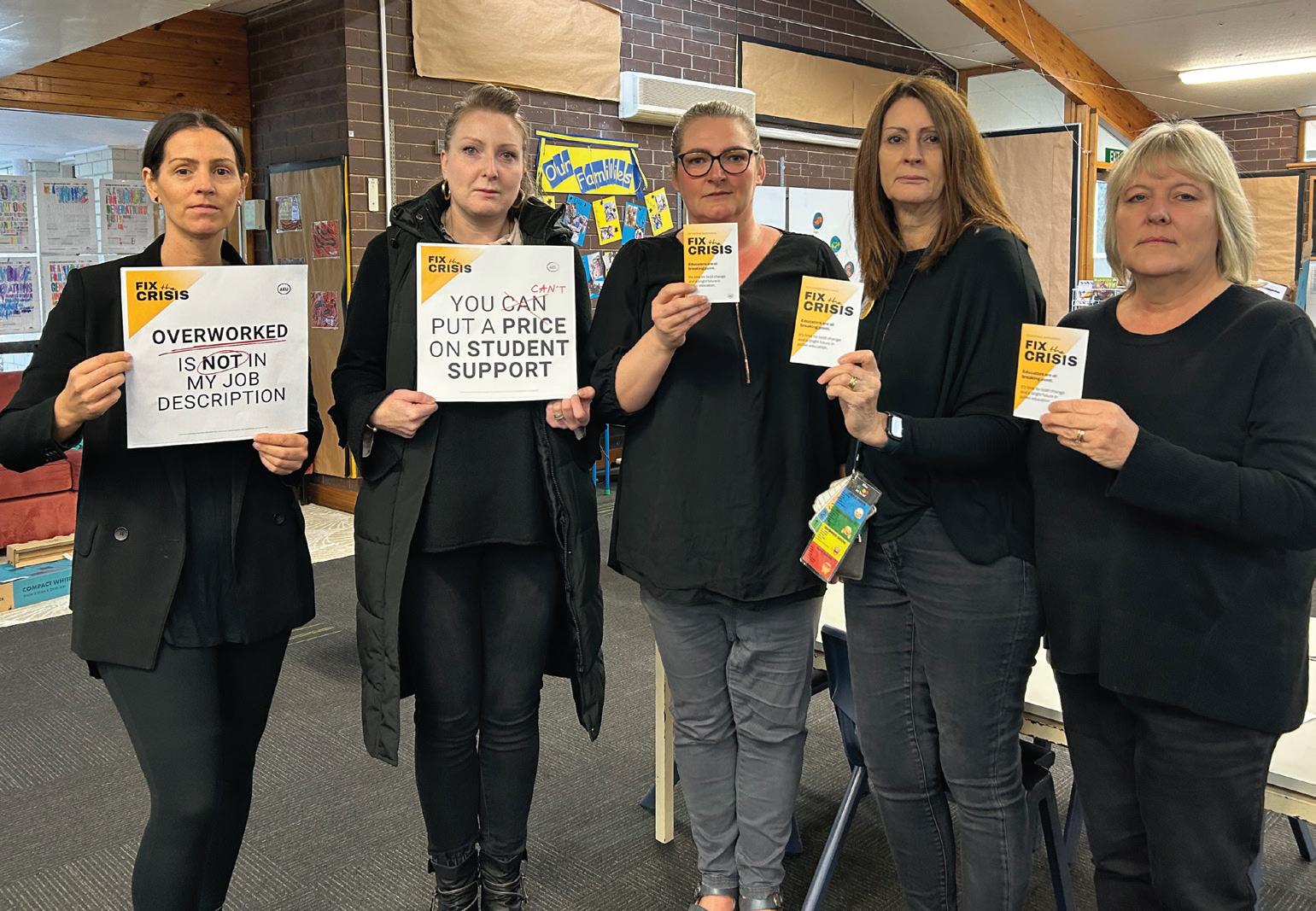
 ANDREW GOHL, BRANCH PRESIDENT, AEU SA
ANDREW GOHL, BRANCH PRESIDENT, AEU SA

ENTERPRISE BARGAINING IS HAPPENING
Visit fixthecrisis.com.au to view the platform and receive campaign updates, as we bargain for a better future.
AEU SA Journal | 4
↑ AEU members at Ceduna Area School send a strong message to the Government by wearing black.
↑ AEU members at Hallett Cove R-12 School wearing black to highlight the thousands of hours of unpaid work educators do every year.
Use your voice to make history
What you need to know
+ The referendum asks us to recognise Aboriginal and Torres Strait Islander people as the First People of Australia and give them a say on matters which affect them
+ The Voice to Parliament is an essential step toward becoming an Australia we can all be proud of
+ It’s time to have conversations with your community about voting Yes.
I recently had the privilege of visiting several schools on the Aṉangu Pitjantjatjara Yankunytjatjara Lands, where partnerships between Aṉangu and school leadership are driving positive outcomes in learning, culture, and community engagement.
It was inspiring to witness, and in many respects, it represents a template for the Australia we could be. One where collaboration, consultation, and community underpin everything we do.
The Voice to Parliament is a practical step toward becoming that Australia.
The Voice acknowledges Aboriginal and Torres Strait Islander people as our nation’s First People, paying respect to over 65,000 years of custodianship and cultural connection. It will ensure we make an ongoing commitment to close the gap in life expectancy, education, employment, and incarceration for Aboriginal and Torres Strait Islander people. The Voice also means that this work is done handin-hand with Aboriginal and Torres Strait Islander people, who best understand what their communities need to flourish.
Despite the overwhelming benefits of an enshrined Voice, polling shows support is dropping in South Australia. The national conversation has been muddied, but the Voice remains an essential step toward becoming a country we can all be proud of.
As educators and unionists, we know the cost of missing this opportunity is far too high. We have a proud history of pioneering progressive change that contributes to a fairer Australia for our kids. We understand the importance of being consulted on the decisions that affect us. And we know that the most effective campaigns are powered by trusted conversations.
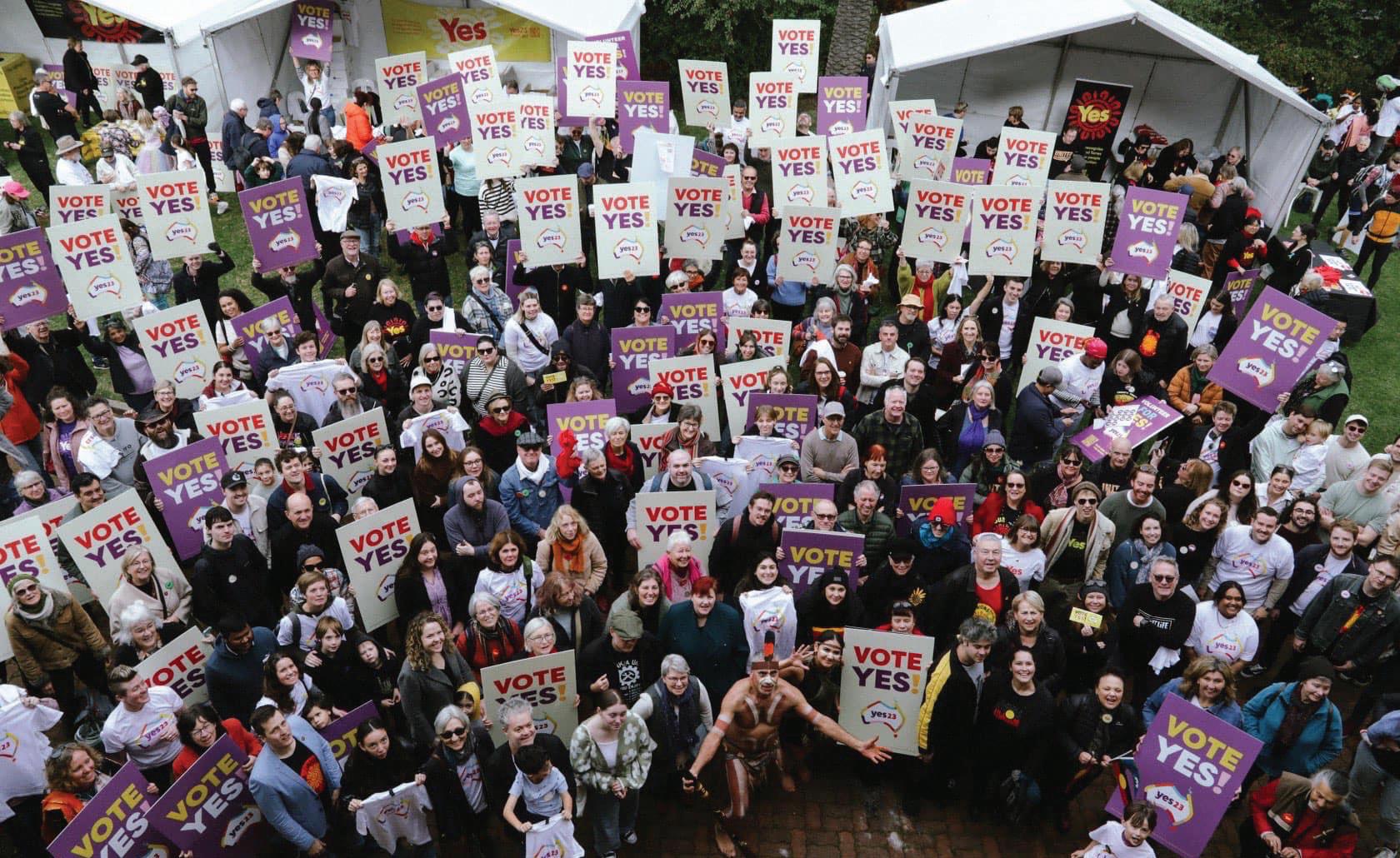
In your conversations with colleagues, family, and friends, try to first connect on the principles you agree on. Most will rightfully recognise that Aboriginal and Torres Strait Islander people were the first inhabitants of this land. The question is then simply whether our Constitution should recognise it, too.
That is what we are voting on, whether “to recognise the First Peoples of Australia by establishing an Aboriginal and Torres Strait Islander Voice”. Come polling day, the resounding answer from Australians must be Yes!
There are plenty of ways you can make a practical difference in the outcome of this referendum. Using your voice to engage and educate the people around you is one of the most important.
CALLUM PENLEY, CAMPAIGN DIRECTOR, AEU SA
YES! WHAT CAN I DO?
Head to Yes23.com.au to find resources for all of these simple and effective actions!
CAMPAIGN UPDATE: AEU SA FOR YES
WHAT I'M DOING TO SUPPORT A YES VOTE
SPEAK
To your community about why it’s important to vote Yes. Be patient, listen, and focus on people you know are willing to hear you. If you’re not feeling confident, you can read about what a Yes vote means online before you sit down for your first chat.
WEAR
Your Yes merch! You can purchase Yes tees, hoodies, caps, beanies, badges and more online or at campaign events throughout the year. Wearing the Yes message is a simple and effective way to spread the word that a Yes vote is a vote to be proud of.
DO
Get out and help. You can come along to events or even volunteer locally. It’s a great way to meet like-minded people and make a real difference in the Yes campaign.
LISTEN
This is a period of increased racism for Aboriginal and Torres Strait Islander people. Make sure to take the time to be a supportive and listening ear for the folks in your life who might be feeling it right now.
READ
Sign up for the official Yes 23 newsletter to stay up to date with the latest news from the campaign around Australia.
WRITE
To your local MP and let them know why a Yes vote is so important. It’s your local member’s job to represent you in Parliament, make sure they know you support the Yes campaign.
AEU SA Journal | 6
WANT TO GET INVOLVED?
Find out more and access resources at aeusa.asn.au/yes
WHY I'M VOTING YES
Hear from our members on why they've decided to vote Yes to Voice, recognising Aboriginal and Torres Strait Islander peoples in our Constitution.
 SETIO SHANAHAN CENTRAL TORRES STRAIT ISLANDS / PORUMA
SETIO SHANAHAN CENTRAL TORRES STRAIT ISLANDS / PORUMA
ABORIGINAL EDUCATION
CONSULTATIVE COMMITTEE
MEMBER AND HPE TEACHER , PORT AUGUSTA PRIMARY SCHOOL
AARON
MURRAY-RASCHELLA
WEMBA WEMBA / WIRADJURI
ABORIGINAL SECONDARY EDUCATION & TRANSITION OFFICER, THE HEIGHTS SCHOOL
Having had many conversations about the Voice with the general public lately, I've found that most people really have a fear around voting Yes because they are concerned about what they will lose and how it will affect them. No one is asking how it will affect our First Nations people in these conversations. What the Voice means to me is an opportunity for the country as a whole to seek guidance and knowledge from First Nations people regarding the direction of our country. This is important because the true history of this country has been long hidden from the majority of people, therefore many people have a misguided opinion of First Nations people. Hopefully, the Voice breaks down barriers to understanding and influences the country's consciousness, sparking the change our elders have been working on for hundreds of years now.

The Voice, cultural understandings, and the First Nation’s perspectives are culturally diverse and complex. Over the past 235 years of European influence, the disruption and seizure of land, loss of cultural elders, and displacement of children over generations have been significant. They have impacted all Aboriginal and Torres Strait Islander people and change to legislation has been slow coming.
The Voice to Parliament is an act of constitutional freedom and representation. It is a Voice that has been heavily suppressed over the past two centuries. I strongly encourage the principles behind the Yes vote. The ambition is to continue to pursue integrating the shared history and objective: the enshrinement of an Indigenous Voice to Parliament in the constitution, followed by a Makarrata process of treaty-making and truthtelling. I am new to this movement but it represents a change in how the Government makes decisions about the rights and lives of all Aboriginal and Torres Strait Islander people and the right of First People to be part of those decisions.
AEU SA Journal | 7 FROM OUR MEMBERS
JOSH JENNER
WIRANGU / KOKATHA (WEST COAST OF SOUTH AUSTRALIA)
ABORIGINAL EDUCATION, PE AND ARTS TEACHER, BALAKLAVA HIGH SCHOOL
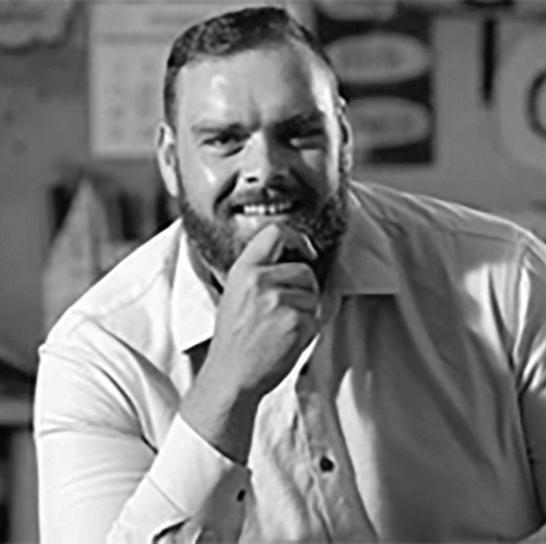
I believe that having a Voice in Parliament is extremely important as it will give First Nations people representation in current policies and decisions. Although this doesn’t mean that every decision the Government makes will have to go through the committee, we need to push to have this Voice as I think it will lead to more positive outcomes over time, like a Treaty and recognition that our land was never ceded.
HOW I'M VOTING YES
For your vote to be elegible, you will need to write the word
This is a draft of the question to be put to voters, available in the Constitution Alteration (Aboriginal and Torres Strait Islander Voice) 2023 Bill that was introduced into federal parliament in late March.

AEU SA Journal | 8
"TO ALTER THE CONSTITUTION TO RECOGNISE THE FIRST PEOPLES OF AUSTRALIA BY ESTABLISHING AN ABORIGINAL AND TORRES STRAIT ISLANDER VOICE."
I want my grandchildren to have a voice in their future
What you need to know
+ It’s time for Aboriginal and Torres Strait Islander people to have a Voice on matters which directly affect them
+ We must enshrine an Aboriginal and Torres Strait Islander Voice in the Constitution to guarantee that place no matter who is in Government
+ It’s time to help our communities see that saying Yes to Voice is saying Yes to a future we can all be proud of.
We as Aboriginal and Torres Strait Islander people have a chance for our voices to be heard. For our elders, people, and communities to have a Voice on matters which directly affect us - such as how we can work together in closing the gap around education, health, and the incarceration of our people.
It’s time for our people to have a seat at the table, to give advice, and to work alongside the law and policymakers whose decisions impact our daily lives. It’s time we let them know what’s not working, where the support is needed, and how that support should be delivered.
I am voting YES because I want the voices of our people to guide the next generation.
I want my grandchildren to have a Voice in their future. The world is changing. We need to learn from our past and move into the future without losing our traditions, culture, identity, hopes and dreams. I believe a Yes vote is a step toward that future. We must enshrine our Voice in the Constitution to guarantee our place no matter who is in Government. We need to be heard, consulted, and respected – as we should always have been.
There’s a lot of information out there about the Voice to Parliament. Let’s come together and learn from each other so we can help our communities see that saying Yes to Voice is saying Yes to a future we can all be proud of.
Find out more and access resources at aeusa.asn.au/yes
This may be the only valuable referendum I take part in in my lifetime. I want to make sure my Yes vote counts. But our people are only 3% of the Australian population, so we need all voting Australians to walk with us and support the Yes vote.
 MICHELE APPLETON ORGANISER (ABORIGINAL FOCUS), AEU SA
MICHELE APPLETON ORGANISER (ABORIGINAL FOCUS), AEU SA
AEU SA Journal | 9 YES!
↑ Michele pictured with her grandchildren, Xavier left and Malakai right.
SUPPORT THE YES VOTE
What you need to know
+ Members from around SA gathered for our annual Reconciliation Conference in June

+ Sarah Finney reflects on the day and her role in Reconciliation
+ Reconciliation is the work of every educator, every day.
9.15AM
Uncle Moogy’s Welcome to Country and smoking ceremony filled the brisk Autumn morning. He invited all our ancestors to be with us as we spent the day learning and discussing, and for us to enter the conference in the spirit of kindness and togetherness.
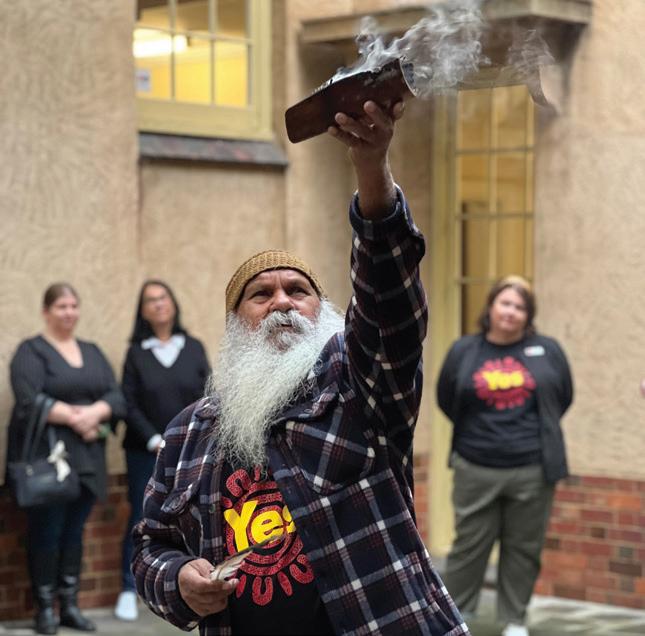
Spend the day with me: AEU SA Reconciliation Conference
10AM
Lara Watson from ‘Unions for Yes!’ spoke with passion, pride, and power. She modelled history using a ball of string and I was again alerted to the minuscule length of time that the colonial occupation of Australia has lasted. Laura’s dedication to her job, visiting localities in Australia to spread the word that something must be done to right the wrongs of history and the present, shone through.
1.30PM
For the last part of the day, Natalie Gentle from Reconciliation SA walked us through the Narragunnawali: Reconciliation in Education
Reconciliation Action Plan. She spoke with passion and compassion about her work and how she can offer support to sites looking to write a reconciliation action plan (RAP). This was extremely useful as we are just beginning to write our RAP at my site. Working with Natalie reminded me that our work to contribute to Reconciliation should be part of every day. As educators, we must remember and teach, so that injustices of the past can never be repeated.
REFLECTION
Once inside, we were privileged to hear Uncle Moogy’s reflections on a great fellow Narrindgerri man, David Unaipon. Uncle Moogy told us that listening was vital to keep you out of danger from flying boomerangs, to close the gap, and to change our future as a country. Finally, he thanked members for showing their support for a Yes vote on a Voice to Parliament, which is vital to learning and healing.
11.15AM
Three dedicated educators shared Reconciliation stories from their sites with us. Sarah, the director at Eden Hills Kindy, spoke of children as young as four making change for the better. Jess, a teacher at Findon High School, showed us the grounds work at her site including the development of their Kaurna scar tree. Finally, it was moving to hear from Alice from Blair Athol North, who spoke about the inclusive programs at her site which provide a special place for Aboriginal students.
12.15PM
We heard from Kyam Maher MLC, South Australian Attorney General and Minister for Aboriginal Affairs and Industrial Relations. He spoke earnestly and proudly about the SA Voice to Parliament, how it has been achieved and how it will function.
When will my Reconciliation work be done? When injustices are righted. When grief is acknowledged, its causes ended, and those who feel it can begin to heal. When the life expectancy and educational outcomes of Aboriginal and Torres Strait Islander people of this country match that of the rest of the population. When all Aboriginal and Torres Strait Islander people seeking to find their roots, culture, and language have found them. When every Australian can proudly speak honestly and proudly about what our country is doing to heal, change for the better, and truth-tell. Then my work will be done.
SARAH FINNEY TEACHER AND AEU MEMBER

AEU SA Journal | 10 IN OUR MEMBERS SHOES
↑ Members engaged at the Reconciliation Conference in Term 2.
↑ Uncle Moogy speaking to members at Reconciliation Conference.
Supporting our support staff
Support staff are integral to our sites and our students. But too many support staff are undervalued by the education system, struggling to achieve job security and a living wage.
During Support Staff Week of Action, we celebrate the amazing contributions of our ECW, AEW, and SSO colleagues and take action to improve their working lives. Every year, the week of action takes place in week five of term three. Your SSO, Aboriginal Education, and Early Childhood Consultative Committees have agreed that this year, the focus of member actions will be on permanency for support staff.
We know there are significant shortages of SSOs, ECWs, and AEWs.
Key points
+ Support Staff Week of Action is this term, from 21 – 25 August 2023
+ The best way to show our support for support staff is to demand higher levels of permanency
+ Get involved in the Support Staff Week of Action to make a change for SSOs, ECWs, and AEWs.

Too many support staff members are on term-by-term contracts or given too few permanent hours.
Many school and preschool leaders and PACs see the value in keeping their teams together and want permanency for their support staff, but current short-term Federal and State funding arrangements often prevent it from being viable for the site. We’re calling on decision-makers to change that.
If you want to see a change in how we value our support staff, get involved during our Support Staff Week of Action. Get behind your support staff and support them to become permanent or increase their permanent hours. It takes collective action – you, your sub-branch, and your PAC all working together to make it happen. Until then, don’t forget the small acts of thanks for support staff like morning teas, assemblies, and choccies that many of you do so well – a bit of tasty appreciation is good, too!
JAN MURPHY VICE PRESIDENT, AEU SA
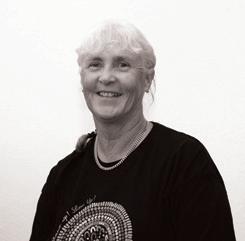
AEU SA Journal | 11 FROM THE VICE PRESIDENT
To attract and retain these invaluable members of our school and preschool communities, we all
need to stand up and demand that they are valued in tangible ways.
+ Thursday 5 Oct, 6pm + $20pp + drinks Dinner See the full program and register at aeusa.asn.au/ssoconference Union Focus Improve Wellbeing Build Networks 2023
Conference A learning, networking, and wellbeing focused conference to connect AEU SA SSO members. + Friday 6 Oct, 9:15am – 3:30pm + AEU Conference Facilities + Free for AEU members
SSO
Monday 21 - Friday 25 August 2023
Support Staffweek of
action
Valued Secure Effective
Let’s make our support staff permanent.
Come together for Support Staff Week of Action to celebrate support staff, demand higher levels of permanency, and make a tangible change for our brilliant SSOs, ECWs, and AEWs.
See the full program and register at aeusa.asn.au/ssoconference
A passionate Country Educators Roundtable
Last term, the AEU hosted the Country Educators Roundtable, offering both members and non-members the opportunity to speak to the Department’s Country Education Strategy leads as well as Chief Executive Martin Westwell. Nearly 60 educators attended to share their passionate insights into country education.

We know there’s something special about living and working in the country, so we asked attendees to share what attracted them and keeps them in there. Many in attendance saw living and working in the country as an opportunity to grow as a professional. Many wanted to offer their skills to students and communities that could significantly benefit from their expertise. Unsurprisingly, educators told us that strong community bonds and a sense of connectedness are what keep them in the country. Many of the responses echo Emma O’Shaughnessy’s statements at the beginning of the Roundtable when she described her experiences in the country. You can read Emma’s address on page 15.
While we know that country educators love their communities, we also know they experience significant daily challenges. The most prominent challenge expressed by attendees was staffing. If you live and work in the country, your site is almost definitely understaffed. Our country educators also struggle to access important services, particularly consistent healthcare, and experience greater costs due to the limited availability of goods and services.
We finished the evening with a conversation focused on what we can do to address the issues raised.
What you need to know
+ More than 60 country educators met with the Department and the CE to discuss issues facing country education
+ A passionate discussion led to new insights shared and solutions offered
+ The AEU are pursuing improved country conditions to attract and retain educators
Attendees offered a range of suggestions, from the provision of furnished housing and reductions in class size requirements, to increased funding for country schools. Many of the calls for action drew on the need for improved Country Incentives.


The AEU is currently addressing Country Incentives through enterprise bargaining. The Country Conditions Standing Committee, in consultation with country Branch Council delegates, has established a bargaining platform designed to both attract and retain country educators. In that platform, we’re calling for:
+ Country Incentives for ancillary staff
+ Increased and ongoing Country Incentives payments which increase after the fifth year of country service
+ The provision of a new type of Country Leave, similar to Retention Leave
+ More PRTs and ongoing PRT employment.
MATTHEW CHERRY VICE PRESIDENT, AEU SA

JOIN A COMMITTEE
Looking to make more of an impact as an AEU member? Join one of our committees, aeusa.asn.au/committee
AEU SA Journal | 13 FROM THE VICE PRESIDENT
Members attending the Country Educators Roundtable at Stirling North Primary School. →
The greatest act of optimism
What you need to know
+ Moving to the country offers brilliant professional opportunities to new educators

+ Country sites and towns need more support and resources, so we attract and retain educators
+ Let’s stand together to help the Government see that country schools are worth their investment.
New educator Emma tells her story of moving to Port Augusta to teach at School of the Air.


In 2021, after my first two years of teaching, I decided I was ready for a change. I moved from my school on the South Coast to teaching reception at Port Augusta School of the Air. I wish I could say the only thing that motivated my move to the country was adventure, but the prospect of permanency was also appealing.
I applied to country schools across different regions, all three or four hours’ drive from the city. I wanted to make sure I was still close enough to see my friends and family, and not to miss out on all the weddings, engagements, and baby showers that rush in during this time of life.
I was lucky to win permanency at the School of the Air. Excited to see both a Kmart and a Big W in Port Augusta. Thankful that the process of moving into Government employee housing where the rent is affordable, and the property is well maintained, was straightforward. But I’m keenly aware that this isn’t the case for all country educators.
Moving to the country has been both beneficial and challenging. I’ve loved becoming part of the Port Augusta community and connecting with other young professionals who have moved here for work. I’ve joined a local netball

team, I’ve attended balls, and I’ve built a social life with this new network of friends and colleagues. As an educator, I’ve had the opportunity to present at professional learning days, led initiatives at school, had the Minister for Education join my lesson, and spoken at the AEU Country Educators Roundtable. With less than four years of experience, these are opportunities I know only a country school could give me. I’ve also gained a new understanding of country terminology. My students live on remote and isolated stations across the state, and within my first few weeks I had already learnt the meaning of ‘mustering’, ‘drafting’ and ‘smoko’. During the first rain of the season, one of my students exclaimed ‘It’s raining money!’, a very different attitude to the city students I taught previously who were just upset about having an indoor recess.
But coming to Port Augusta has not been without its challenges. Our struggles with youth engagement and anti-social behaviour made me think twice about moving as a young, single woman. I don’t feel safe walking at night and find myself concerned about break-ins and property damage in the area. This also makes it challenging for the school to find new staff and positions are often repeatedly readvertised. These unfilled vacancies create an additional workload for those of us working here. The town lacks quality services such as health specialists which often means taking time off to go to Adelaide for essential care. Because of my heavy workload, I often feel too guilty or overwhelmed to take this time off, which means that my health needs are not always being met. My colleagues and I are constantly weighing the positives with the negatives of country teaching, and hoping the positives will come out on top. Colleen Wilcox says that “teaching is the greatest act of optimism”. I believe that choosing to teach in the country is the greatest act of optimism. I hope we can continue to stoke that here, so we can attract the educators we so desperately need. But optimism isn’t enough, we also need support and resourcing to ensure we retain the brilliant country educators we have across the state. I’m hopeful that, standing in solidarity as members, we can help the Government see that country schools are worth that investment.
AEU SA Journal | 14 NEW EDUCATORS
EMMA O’SHAUGHNESSY TEACHER AND AEU SA MEMBER
AEU
BRANCH EXECUTIVE BRANCH EXECUTIVE
AEU SA AREA MEETINGS Register for your local meeting at aeusa.asn.au/areameetings
DAY
TRAINING
For
Authorised by M.Cherry, Australian Education Union (SA Branch), Kaurna Country, 163 Greenhill Road, Parkside SA 5063.
OF ACTION
AEU
SA EARLY CHILDHOOD CONFERENCE
SA SUPPORT STAFF WEEK OF Acknowledging and appreciating the amazing SSOs, ECW's,
AEU
LABOUR
AEU SA SUPPORT STAFF WEEK
CHILDREN’S
AEU
UPPER
BRANCH
WHYALLA LE FEVRE MITCHAM/ AEU MERIT
EARLY CHILDHOOD
Term 3 Planner NATIONAL
AND PROFESSIONAL LEARNING AVAILABLE TO AEU MEMBERS
more information head to aeusa.asn.au/upcoming
MERIT SELECTION RETRAINING
BOOK WEEK
MEMBER PAC TRAINING
SOUTH EAST
EXECUTIVE TORRENS/WESTERN URBAN
SELECTION RETRAINING
EDUCATOR’S DAY
TAFE
DAY AEU FEDERAL WOMEN’S CONFERENCE
AEU
and AEW's. For more information head to aeusa.asn.au/sss FAR WEST / EYRE LINCOLN NORTH EAST URBAN BAROSSA NORTH WEST ELIZABETH/MUNNO PARA SOUTHERN YORKE SOUTHERN URBAN LOWER FLINDERS FAR NORTH RIVERLAND KANGAROO ISLAND TEA TREE GULLY MID NORTH MURRAYLANDS NORTHERN YORKE FLEURIEU GAWLER Week Monday Tuesday Wednesday 1 24 JULY 25 26 2 31 01 AUGUST 02 3 07 08 09 4 14 15 16 5 21 22 23 6 28 29 30 7 04 05 06 8 11 12 13 9 18 19 20 10 25 26 27 Holidays 02 03 04 09 10 11 VOICE. DOES LOWER CENTRAL VOICE. DOES SBS SKILLS NORTHERN NORTH WEST NOARLUNGA
AI IN EDUCATION: HACKS, ETHICS AND NEW FRONTIERS
MEMBER PAC TRAINING AEU MERIT SELECTION RETRAINING

OF ACTION work of all the aeusa.asn.au/sss NORTH PULLMEOUTANDPINMEUP! Thursday Friday Saturday Sunday 27 28 29 30 03 04 05 06 10 11 12 13 17 18 19 20 24 25 26 27 31 01 SEPTEMBER 02 03 07 08 09 10 14 15 16 17 21 22 23 24 28 29 30 01 OCTOBER 05 06 07 08 12 13 14 15 Disclaimer: AEU SA has done its best to ensure that all information provided was accurate at the time of printing. aeusa.asn.au aeusa.asn.au 08 8172 6300 aeusa aeunionsa aeusa BRANCH COUNCIL WOMEN’S BREAKFAST NEW UNION REPS: LEVEL 1 VOICE. TREATY.
DOES
MEAN FOR PUBLIC EDUCATION? WEAR IT PURPLE DAY PRINCIPALS’ DAY AEU SA WOMEN’S DINNER + CONFERENCE UNION FINANCIAL GOVERNANCE TRAINING HILLS SOUTH EAST CENTRAL URBAN / EASTERN URBAN AEU SA ABORIGINAL MEMBERS R U OK DAY TREATY. TRUTH.
DOES
MEAN FOR
EDUCATION? DAYLIGHT SAVINGS STARTS DINNER + CONFERENCE SKILLS AND ADVICE HUDDLE PORT PIRIE NORTHERN URBAN / WEST URBAN TAFE DIVISIONAL COUNCIL NOARLUNGA / SOUTHERN VALES AEU SA SSO CONFERENCE AEU SA WOMEN’S CONFERENCE An opportunity to network,
up’. For more information head to aeusa.asn.au/womensconference
TRUTH. WHAT
IT
WHAT
IT
PUBLIC
question, empower and ‘step
Make your mark
Workload weighs heavy on TAFE members
What you need to know
+ Our 21 & Done campaign has gained the attention of TAFE SA
+ The employer continues to flout our EA-enshrined rights
+ Sign the pledge to hold the employer accountable.
Our 21 & Done campaign has spread quickly amongst TAFE SA educators across the state, gaining the attention of TAFE SA leadership. As a direct response to TAFE SA member action, TAFE SA Chief Executive David Coltman has begun to communicate with us on the employer’s initiative to modify the application of workload clauses in the TAFE SA Educational Staff Enterprise Agreement 2022 (EA 2022)
Flouting our Enterprise Agreement
Ignoring consultation processes
ADVERTISE WITH US:
If you would like to advertise in an upcoming edition of the Journal, email Journal@aeusa.asn.au for details and rates (where applicable).
SUBMIT A PIECE:
Do you have a story to share? Send us an email: Journal@aeusa.asn.au
+ Articles: maximum 400 words + Letters to the editor: maximum 200 words.
All submissions should be signed with name, membership status, and role description. If you would prefer to remain anonymous, please indicate this in your submission.
Editorial policy: Not all articles submitted will be published. Articles, letters to the editor, and advertising in the Journal do not necessarily represent the views of the AEU. Submissions may be edited for publication.
EDITORIAL DEADLINES:
AEU SA Journal Deadlines 2023
+ Term 4: 1 September 2023
AEU SA Journal Deadlines 2024
+ Term 1: 8 December 2023
+ Term 2: 15 March 2024
+ Term 3: 7 June 2024 + Term 4: 30 August 2024
We are concerned that there has been no formal or meaningful consultation with the AEU on the employer’s initiative. Our review of the employer’s initiative indicates that the employer is seeking to redefine the meaning of Instruction and Assessment. In their initiative, the employer is proposing that only workplace assessment, observation, facilitated instruction, flex delivery, facilitated online delivery, student interactions as a part of e-learning, flipped classroom, and allocated project work be counted in the hours of Instruction and Assessment. This is narrower than the current Agreement outlines.
Additionally, they are completely ignoring clause 5.3.4, by proposing team meetings, PL meetings, information and enrolment events, product development and redevelopment, work associated with the delivery of training and assessment, development and customisation of course content, liaising with industry and employers about skills and training requirements and auditing requirements, WHS meetings, professional development, committee work, assessment materials, moderation meetings, validation meetings, higher education meetings, mentoring another lecturer, delivery planning, lesson planning, and audit requirements not be included in Instruction and Assessment workload allocations.
The AEU lodged a formal clause 3.1 dispute in response to the employer’s failure to consult the AEU in this initiative, a process enshrined under EA 2022. Our dispute asserts that the employer’s Instruction and Assessment initiative would be seen as the employer seeking a variation to the EA 2022, which would strip workload entitlements. The dispute highlights that the nature of this approach would remove the EA 2022-enshrined entitlement of Educational Managers to manage lecturer workload and for workers to request that their workload be managed, further exasperating excessive workloads across the organisation. In response to this dispute, the employer has written to the AEU in SA to commence formal consultation on their proposed Instruction & Assessment initiative. However, at the time of printing, there has been no request to meet and commence consultation.
We are receiving troubling reports from members across TAFE SA that the employer is already allocating semester two lecturer workloads based on their initiative. Once again failing to maintain the status quo as required in the dispute process.
As a TAFE SA member, it’s more important than ever to take the 21 & Done pledge to ensure your voice is counted as we fight to maintain your workload entitlements.
ANGELA DEAN ORGANISER: TAFE FOCUS, AEU SA
AEU SA Journal | 17 TAFE UPDATE
TAFE educators are working above the hours for which they are paid. Stand against excessive workloads by pledging to 21 & Done.
WHAT IS 21 & DONE?
The goodwill of TAFE educators is being taken advantage of and a legally binding enterprise agreement is being ignored. Educators are being pressured to work above their 21 hours of instruction and assessment, developing resources, providing student counselling, conducting RPL & RCC assessments, undertaking quality assessment and audits, undertaking industry engagement, undertaking professional development, and undertaking program coordination duties in their own time.
TAFE educational staff are now working an average of 10 unpaid hours each week. In addition to this excessive workload, the employer is freely misinterpreting the enshrined regulation of our workload set out in the enterprise agreement.
The employer believes these duties should be carried out by lecturers in the 14 hours of administrative time they have allocated each week. This is an unattainable business model developed by the current leadership at TAFE SA and is in breach of our industrial entitlements.
Our 21 & Done campaign highlights the excessive workloads all educational staff face at TAFE SA. It also draws attention to the inconstancies in how workload allocations are applied across educational programs.
We’re asking all TAFE educators to demand a maximum of 21 hours of instruction and assessment time for full-time staff, and 14 hours dedicated to supporting program delivery.

+ Excessive workloads are driving quality educators and students away from TAFE, as resources are shamelessly stripped away
+ The new ‘business’ model disrespects educators, as more and more is expected for less than ever before
+ TAFE must honour fair conditions so educators can perform their skilled work within paid hours.
Stand with your colleagues, ready for action as we build our collective power.
TAKE THE PLEDGE
TAFE
AEUSA.ASN.AU/21DONE
Sports Day should be for everyone!
Here are some easy ways to help transgender and non-binary students have a great sports day.
Did you know that Department procedure states that ‘gender diverse students must be supported to participate in sporting events that align with their gender identity’?* If you didn't, you aren't alone. We recently reached out to the Department to ask about diversity and Sports Day and received some helpful pointers on Department procedures.
If you’re looking for ways to be an ally and make sports days welcoming for gender-diverse students at your site, we’ve put together some easy tips to get you started.
DON’T ASSUME
Not sure about a student’s gender identity or wondering which gendered event a student might feel comfortable participating in? Listen for cues from the student and their friends. If you’re still unsure, stick to using they/ them pronouns and try introducing yourself using your own pronouns.
ENCOURAGE
Encourage your gender-diverse students to let you or another advocate know what they need to have a great day. For more confident students, encourage them to get involved in organising parts of sports day, like games, events or celebrations! As public educators, it’s our job to make sure every student has the chance to participate in sports for their physical and mental wellbeing, but that can only happen in a safe and encouraging environment.
LISTEN
Find out what events your gender-diverse students are interested in. It’s a great way to build good relationships. Have a chat ahead of the day and make sure they’re feeling welcome and excited. Pay attention and listen to hear if there’s anything you can do to make the day more fun. If you think one of your gender-diverse students feels uncomfortable about sports day, offer to advocate for them, make sure they’re doing events with friends, and let other educators know they might need extra support on the day.
SET AN EXAMPLE
Do something every day to be an ally to the genderdiverse community. Your gender-diverse students are more likely to trust you and feel safe at school if you show you support them daily. Using inclusive language, taking care to use correct pronouns, and clearly discouraging discrimination from other students and colleagues will let gender-diverse students know they’re welcome in your classroom. Take this into the staffroom too, an inclusive culture between staff is essential to a happy and healthy workplace.
LEARN MORE
You can read the Department for Education’s mandated ' Gender diverse, intersex and sexually diverse children and young people' policy and procedure at bit.ly/DfE-policy-gender-diveristy
Schools can also access specialist advice by contacting the Engagement and Wellbeing directorate at education.engagementandwellbeing@sa.gov.au
If you’re interested in being more active in the AEU and supporting LGBTIQ educators and students, you can come along to observe a meeting of our Lesbian, Gay, Bisexual, Transgender and Intersex (LGBTI) Consultative Committee and join our LGBTIQ Educators Network group on Facebook, @aeusalgbtiq Find out more, aeusa.asn.au/committees
* Department for Education ‘Gender diverse and intersex children and young people support procedure’, 2023
AEU SA Journal | 19 GENDER DIVERSITY AND SPORTS DAY: LGBTIQ CONSULTATIVE COMMITTEE
Band B salaries must be a critical issue in EB negotiations

The phrase ‘cost of living’ has gone from a catchphrase used by politicians and pundits in the media to a harsh reality for most Australians.
As we negotiate a new Enterprise Agreement (EA) with the Department, addressing the cost of living pressures felt by educators is paramount. Rents and mortgages are growing out of reach, grocery items like cheddar cheese are becoming luxury items, and energy and fuel costs are unsustainable.
The growing cost of essentials – housing, food and energy – is putting intense pressure on inflation and cannot be eased because these items are, by their definition, essential. I will leave arguments about the precise percentage increase all education workers require to keep up with the cost of living to the AEU team negotiating our EA with the Department. However, if public educators are to be able to afford essentials, they need a pay rise that is in line with inflation, which has been over 7% since September 2022 (groceries alone increased by 10% in 2022 and are still too high at 8%). Contrary to claims by previous Federal Governments and current heads of the Reserve Bank, corporate tax reform is the key to curbing inflation, not stagnating employee wages.
VALUING OUR LEADERS
I also want to address a looming leadership void in South Australian public schools ahead of our forthcoming EA. In our last EA, the gap at Band A leadership level partly drove arguments for Band A leaders to receive a pay rise 1% per annum higher than the rest of the public education sector. I fully supported this. Leading an education site is a demanding role that requires hard work, dedication and high-quality skills in leading people and curriculum. Site leaders work exceptionally hard and deserve a wage that takes the professionalism required for the role seriously. It is also my opinion that we are at risk of losing excellent Band B leaders if these roles are not taken as seriously as we do our site leaders. Band B-1 and B-2 leaders, which include faculty coordinators and senior leaders, are responsible for leading one or two faculties/learning areas and in some cases, a specific area of whole-school improvement such as literacy, numeracy or behaviour support. Band-1 leaders usually receive just 0.2 release – equivalent to one class – to manage their leadership responsibilities, and Band-2 leaders typically 0.4 – two classes. Their remaining time is spent on teaching responsibilities and all the duties that come with it. It should go without saying that many of these duties are completed in unpaid personal time.
KEY TEACHER FALLBACK CLASSIFICATION
Furthermore, leadership positions have limited tenures; usually five years. By following a leadership pathway, many leaders change schools and/or win positions a substantial distance from where they live. Choosing to work at a school with a moderate or significant commute from home has palpable implications as fuel costs rise. These leaders, particularly at Band B-1, may see the difference between their pay and that of the Key Teacher Fallback classification being pumped directly into their car’s fuel tank each week. Key Teacher is the pay classification paid to Band B leaders if they return to a teacher-level role after five or more years at Band B leadership level. It is equal to AST-2, which is only about $100 per week less than a Band B-1 leader. Such a scenario makes the prospect of taking an ongoing classroom position at the Key Teacher classification at a school closer to home and with less responsibility much more attractive.
While a substantial pay increase for all public education workers is essential to keep pace with the rising cost of living, the Department must acknowledge the skills, experience and workload of this tier of leaders, and offer an additional pay increase that values their roles and takes them seriously.
NEXT STEPS
AEU SA Journal | 20 MEMBER OPINION :BAND B LEADERS
About this article + The growing cost of living is being felt by every public educator + We’re at risk of losing Band A and B leaders + We need a pay rise that retains our talented educators and leaders.
Our enterprise bargaining campaign needs support from our leaders. Visit aeusa.asn.au/fixthecrisis to get involved.
BRETT FERRIS ARTS & ENGLISH COORDINATOR, KAPUNDA HIGH SCHOOL
It’s not enough to just react
New laws place an obligation on the employer to actively work to prevent sexual harassment at work.
As you settle yourself into your small, hard aeroplane seat, you’ll hear the familiar refrain, “Smoking is not allowed at any time on this flight”. This instruction is echoed by small no-smoking lights, stickers on bathroom doors, and signs on bathroom mirrors. You are surrounded by reminders of a law, reminders that allow airlines to prove they have done what they can to prevent you from breaking this law. These kinds of preventative measures are known as ‘positive duty’, or ‘the obligation to take action’ and are law. Under these measures, the airline is legally obliged to actively discourage smoking on flights.
Such a measure was recently introduced by the Federal Government around sexual harassment in the workplace. This means that employers are now legally obliged to
In this article
+ New positive duty laws oblige employers to take action to prevent sexual harassment
+ These measures should be rolled out immediately
+ The AEU wants to hear from you on what positive duty looks like at your site.
‘take reasonable and proportionate measures to prevent and eliminate sexual harassment on the grounds of sex, conduct creating a hostile work environment, or acts of victimisation against another person’ (Equal Opportunity SA, 2023). The law encompasses interactions between employees at a site - for example, between two educators – and any interaction an employee has within their job, including those with parents and students.
The South Australian Equal Opportunity website recommends employers in SA aim to comply with the new obligations as soon as possible. This expectation includes:
+ Ensuring policies, procedures, and training are implemented to reduce the likelihood of sexual harassment occurring
+ Reviewing current systems to ensure deficiencies are identified
+ Making changes and providing employees and managers with the skills needed to address these occurrences.
At the AEU, we want to hear your opinion on what positive duty should look like at your site, what’s currently an issue, and what knowledge is needed to ensure this measure is effectively implemented.
JAKI HEIM WOMEN'S OFFICER, AEU SA
WHAT SHOULD POSITIVE DUTY LOOK LIKE AT YOUR SITE?
Contact Jaki, AEU SA Women's Officer at womensofficer@aeusa.asn.au to ensure AEU member voices are heard during the rollout of this measure.

WOMEN'S OFFICER
As you settle yourself into your small, hard aeroplane seat, you’ll hear the familiar refrain, “Smoking is not allowed at any time on this flight”.
“It has been life-changing!”
Get to know our Anna Stewart Memorial Project participants.
We had the pleasure of hosting Leah and Rachael, our recipients for the 2023 Anna Stewart Memorial Project, for a week in term two. Leah and Rachel are both teachers and active union members, and the project gave them an opportunity to develop the skills, knowledge, and support networks required to be effective workplace leaders and activists; particularly for working women. As well as extensive training alongside participants from other unions, the project allowed Leah and Rachel to spend time at the AEU getting to know staff and understand how the union operates daily. Like Anna Stewart, participants in the project are empowered to create change in their industries and encourage others to do the same.
WHAT MADE YOU DECIDE TO APPLY FOR THE PROJECT?
RACHEL I applied this year because I am determined to help other teachers manage their workload. I’m concerned that people my age are dropping out and that new teachers last an average of five years. That’s a big part of why I’m an active union member. My motto this year is "complain once then be quiet or do something about the problem".
I've joined the Status of Women Consultative Committee because I don’t think we would be having so many problems if this was a male-dominated profession. Then the Anna Stewart Memorial Project came up and looked like a great next step in my journey!
LEAH Over the last 12-18 months, I’ve been thinking about becoming a more active member of the union, especially considering the recent difficulties and challenges we have been experiencing within education. I wanted to better understand unionism and how I could use that knowledge and understanding to support the members at my site.
BEFORE STARTING THE PROJECT, WHAT IDEAS DID YOU HAVE ABOUT UNIONISM?
LEAH Before starting the project, my ideas about unionism were quite rudimentary. I knew that unionism was about implementing policies to support and protect the workers, and more specifically, how our union has fought to protect and advocate for educators.
RACHEL Before the project, I had a reasonable idea of the benefits of union membership but nowhere near the understanding I have now. Cath Story from ACTU taught us that we must get past ideology and focus on the shared interests of workers and employers, then make connections that allow us to make a change.
Talking to the AEU Grievance Officers, Kristie and Graham, reinforced that message. What an excellent team they are, I loved their approach! I didn’t realise how hard everyone at the AEU works. Going with Daniel on a worksite visit was an eye-opener! Organisers have spines of steel.
WHAT SURPRISED YOU DURING YOUR TIME PARTICIPATING IN THE FIRST HALF OF THE PROJECT?
RACHEL When spending time with participants from other unions, I was surprised to learn that, although the workplaces represented were very different, most of the struggles were the same. I was also surprised to hear that some workplaces are still fighting for what the rest of us take for granted, like entitlements around pregnancy, sanitary bins, female-friendly uniforms, and no "naked lady" calendars.
LEAH I was in awe of the role Anna Stewart played in the union to support women. She paved the way for the rights women have in the workplace, rights that we now take for granted. The history of women in the workforce was something I had little knowledge of and discovering the inequities women had to endure was both surprising and shocking.
AEU SA Journal | 22 Q+A WITH THE ANNA STEWART MEMORIAL PROJECT PARTICIPANTS
WHAT ARE YOUR THREE KEY TAKEAWAYS FROM THE FIRST HALF OF THE PROJECT?
RACHEL
+ We have come a long way but there is still a long way to go. We must be united as unions to be effective
+ The gender pay gap is real, even in professions with equal pay. Women still take on more caring responsibilities, are more likely to take time off, reduce time, retire earlier to care, and are less likely to apply for roles because of caring responsibilities. We then have less super. These factors contribute to women over 50 being more at risk of homelessness than ever before
+ It’s important to care for colleagues and promoting union membership is part of that. We are all in this together and can improve things if we unite.
LEAH
+ Women unionists have the power to be agents for change
+ There are still too many inequities for women in the workforce, such as total remuneration, superannuation, part-time work, short term contracts, and carers leave, all contributing to the gender pay gap. Our unions can force change to address this inequity
+ A union is only as strong as its members. Have conversations with the people you work with and encourage non-members to join.
WHAT RECOMMENDATIONS DO YOU HAVE FOR MEMBERS BASED ON WHAT YOU'VE LEARNT SO FAR?
LEAH I would recommend that members become more active within their union. Whether that is by attending Area Meetings, actively supporting their subbranch secretary and PAC representative, talking about the union and our current EB with non-members, or encouraging non-members to join.
RACHEL If you think union membership isn’t important, talk to older members of staff: ask them what’s changed in the time they’ve been teaching. Visit the AEU website, get involved with committees, check out what training is available, and read up on the reasons for joining to help you learn how to encourage others to join.
WHAT ADVICE DO YOU HAVE FOR MEMBERS THINKING ABOUT TAKING PART IN THE PROJECT?
RACHEL Taking part in the project - oh my goodness, it has been life-changing! I’ve been teaching for 30 years and am rarely this impressed by training and development. I also have ADHD and I sometimes find it hard to focus. I was tuned in the whole time, learnt so much, and am thoroughly looking forward to the next parts of the program, as well as catching up with the other participants.
Cath Story from the ACTU was excellent to work with, the program was well-paced and respectful of our needs, and I could not recommend it more highly.
LEAH I would strongly encourage our members to apply for the project next year. It was amazing to meet like-minded, strong women and talk about their successes and challenges within their own industries. Participating in this project will help (re)ignite your passion and provide you with the skills to become a leader, and a force to promote change at your site.
Women’s Conference
2024 APPLICATIONS FOR ANNA STEWART MEMORIAL PROJECT
Applications for the next Anna Stewart Memorial Project will open in early 2024. We’ll let members know when it’s time to apply.
SAVE
+ Dinner: Friday 25 August 2023
+ Conference:
Saturday 26 August 2023
9am - 3:30pm
AEU Conference Facilities
AEU SA Journal | 23
RACHEL BRISTOW TEACHER + AEU MEMBER
LEAH THOMPSON TEACHER + AEU MEMBER
THE DATE 2023 AEU SA
aeusa.asn.au/womensconference NETWORK QUESTION EMPOWER STEP UP
When in doubt, talk it out
Advice from AEU legal eagles, Mika and Cecilia
What you need to know
+ Your Industrial Officers are here to make sure the rights of educators are being upheld
+ Mika and Cecilia support your work in enterprise bargaining, through submissions to Parliament, and more
+ If you have an issue at work, let us know. It’s the best way to keep public education strong.
WHAT WE’RE WORKING ON
As Industrial Officers, we undertake industrial and legal work as well as research at the AEU SA Branch. We both have law degrees, and Mika is a solicitor and has extensive experience as an educator while Cecilia’s experience is in unions and industrial work. We’re the ‘legal eagles’ of the AEU office space, we provide advice to both members and the union officials working at 163 Greenhill Road.
A key aspect of our role is to support negotiations in enterprise bargaining – something that is looming large this year with a new Agreement on the table. We negotiate for both the TAFE and South Australian Schools and Preschool’s Enterprise Agreements. With our skillset, we advocate and negotiate on behalf of our members – whether that’s in sites, to the employer or at the South Australian Employment Tribunal. We write submissions to Parliament, to Royal Commissions, and anything policy-related that impacts our members and the public education system and workforce. We also provide advice to the Campaigns team, who take member experience and turn it into member action!
OUR ADVICE TO YOU
Whenever you have an issue at work – be it something at your site or potential issues with the employer, never hesitate to contact the AEU. As your union, it’s our job to help you. Your first point of contact is our Information Unit. It only takes that simple call or email to get the ball rolling and to ensure that your industrial rights are maintained and advocated for.
As Industrial Officers, we tend to step in when we notice a collective issue – something that’s affecting many of our members and relates to your EA or legalisation. Once an issue reaches us, the outcome and process vary depending on time constraints, whether we are required to go to the South Australian Employment Tribunal, and communication with relevant people. We’re here to make sure that the rights of educators are being maintained on a broad scale. Which sometimes means fighting for those rights in court!
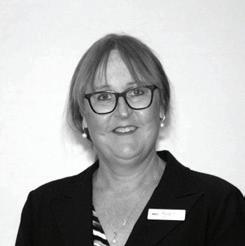
Our advice for all members is: when you’re in doubt, always talk it out. Whether that’s through your subbranch, Organiser, colleagues, or the Information Unit. The only way industrial action can be taken is if we communicate. That is how campaigns like 21 & Done (TAFE) and Fix the Crisis (Enterprise Bargaining) are created. That’s how we ensure that we can make the SA public education sector stronger.
MIKA (MICHAELA) TIPPINS INDUSTRIAL/RESEARCH OFFICER, AEU SA
WE WORK WITH YOU
If you're having issues at work, contact the Info Unit who can point you in the right direction, aeusa.asn.au/info
CECILIA TRAN-PHAM INDUSTRIAL/RESEARCH OFFICER, AEU SA

AEU SA Journal | 24
INDUSTRIAL OFFICERS UPDATE
THE RIGHT TO DISCONNECT
What you need to know
+ We're bargaining for a Right to Disconnect clause in the current round of negotiations
+ This new clause will give you the right to not check work-related digital communications in your personal time
+ The new clause signals a chance for cultural change, moving toward valuing work/life balance for educators.
We're bargaining for a new clause in the upcoming Enterprise Agreement: the right to disconnect. We're seeing some employers in Australia and all OECD countries enshrine the right to stop checking work emails, calls, and messages outside of work time to acknowledge the value of switching off from work outside of work hours.
The new clause will acknowledge the importance of digital technologies to meet the needs of our work but will ask that the Department commits to minimising digital communications with employees to ensure an appropriate work/life balance is met. The clause will encourage educators to disconnect from digital technologies and communications when accessing rest time, weekends, and leave/vacation periods, except in exceptional circumstances.
Of course, this will be a cultural change for many of us. Since technology has saturated our lives, educators have felt obliged to always be contactable. This new clause, coupled with our solutions for reducing workload pressures, will usher in a new culture that values work/life balance.
HOW WILL WE EXERCISE OUR RIGHT TO DISCONNECT?
Members are encouraged to use their professional autonomy to determine when to place an 'out of office' on their email account, or to work with members at their site on developing a school-wide disconnecting policy.
READY TO DRAFT YOUR NEW OUT-OF-OFFICE MESSAGE?
You can get ready by coming up with some outof-office message ideas to share at your site.
‣ "I won't be engaging with emails between 4pm tonight and 8am tomorrow. If something is urgent, you can contact school administration on (phone number) or (email)."
‣ "I'm teaching right now and will endeavour to respond in my NIT. For anything urgent, please contact school administration.”
‣ "I work part-time. My rostered days are (day) to (day)."
‣ "Educators at our site disconnect from their emails from 3pm on Friday until 8.30am on Monday."
ENTERPRISE BARGAINING IS HAPPENING
Visit fixthecrisis.com.au to view the platform and receive campaign updates, as we bargain for a better future.
AEU SA Journal | 25
ENTERPRISE BARGAINING
Meet the comms team




We are your Communications team. Our job is to keep members informed through email, social media, our website, and this Journal! We also help to develop and run campaigns, work with media and Government, and support all union business.
SEREN
One member once described me as the ‘think tank man’. I have the privilege of pulling it all together. It is my job to ensure we work collaboratively to deliver powerful campaigns for change, informed and driven by the experiences of our members.
BARLOW
I produce and publish creative outputs. From refreshing our image with a rebrand to creating assets for the website, socials, emails, events, campaigns and core union business. You might even see me snapping your photo at your next event.
I'm the AEU writer and editor in SA. Everything you read from us was written or edited by me, including this Journal. It's my job to ensure all of our members understand the work the union is doing through clear, thoughtful, and inclusive communication.
I'm responsible for helping our union explore new channels for member engagement. If we’re serious about creating a sustainable union, we must invest in expanding our digital presence – the future is now.
Get information & advice from the Information Unit
The AEU Information Unit provides members with advice on questions of pay, leave and general working conditions.
The Information Unit is staffed:
Monday: 8.15am - 5pm
Tuesday to Friday: 10.30am - 5pm
For advice and assistance please phone 8172 6300 or email info@aeusa.asn.au
AEU SA Journal | 27 COMMUNICATIONS
| COMMUNICATIONS OFFICER
RACHAEL | DIGITAL COMMUNICATIONS OFFICER
| DIGITAL ENGAGEMENT OFFICER
CALLUM | CAMPAIGN DIRECTOR
Brain Breaks
Quick breaks that help you refocus and return to work feeling centered.
Train Tracks: easy
+ Your aim is to fill in some of the puzzle squares to create one continuous piece of track so that a train can travel from one edge square to the other
+ There are horizontal and vertical number clues showing how many pieces of track appear in each row or column
+ It’s useful to put in an x if you are sure there is no track in that square.
2 5 2 1 3 4 1 6 4 3 1 2

Did you know, you can usually claim a tax deduction for union fees?
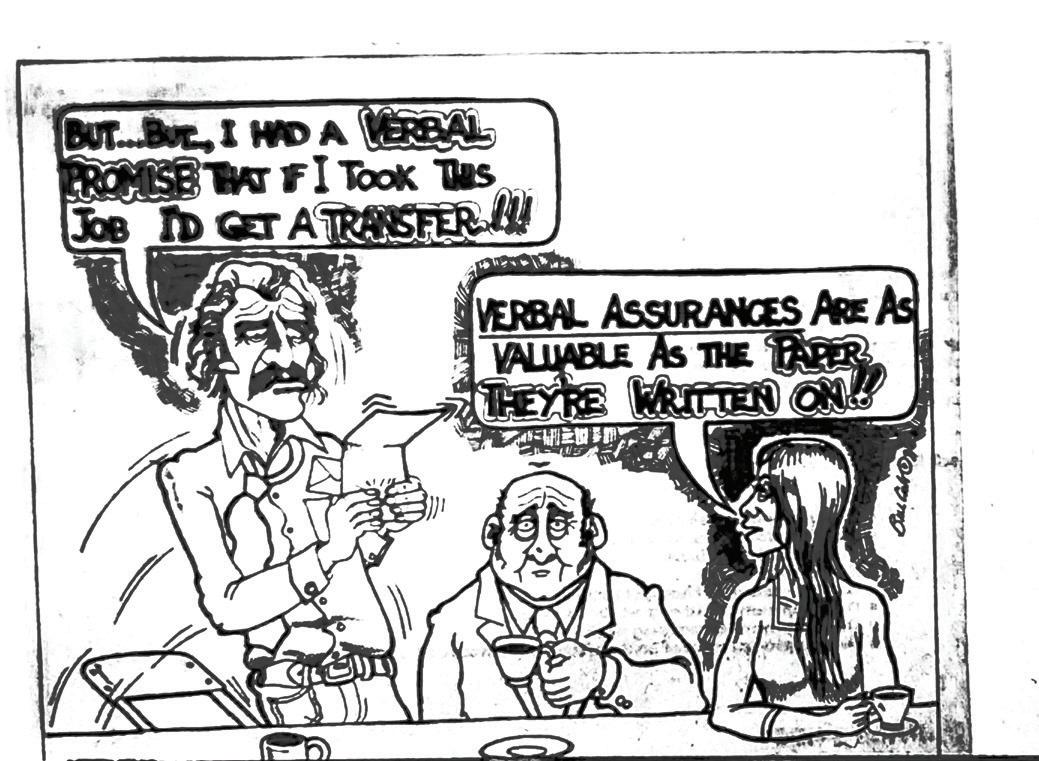
Desk yoga: seated twist
+ While seated with your feet flat on the ground, place the back of your right hand onto the outer side of the left knee and reach the left hand around to touch your back or the back of the chair, gently twisting your upper body
+ To deepen the twist, push the back of your right hand gently into your knee and look over your left shoulder
+ Breathe deeply and slowly, then repeat on the other side.
AEU SA Journal | 28 TAKE A BREATHER
30 years ago, a cartoon for union publications from Bill Cook, artist and former Vice President.
Scan the QR Code to see the answers. Claim your AEU fees as a tax deduction this year. Head to our website to download your tax statement, as well as handy hints from the ATO to help you study up on your other deductions. Visit www.aeusa.asn.au/taxstatement
From
Answers
Professional Learning
Access a wide range of values-based professional learning to develop your practical skills.
Sessions are in real time and allow you to work with other professionals to gain insight and grow as an educator.
EDUCATIONAL
Voice. Treaty. Truth. What does it mean for public education?
+ Thur 17 Aug, 5pm - 6pm
+ Thur 21 Sep, 5pm - 6pm [Repeat session]
+ Cost: Free for AEU members
+ For: All AEU SA members including TAFE and student members
This online session will explore elements of the Uluru Statement from the Heart and consider elements of how public education can connect with Voice. Treaty. Truth.

TAKING ACTION: EB
UPCOMING OPPORTUNITIES
SBS Huddle Taking Action: EB
+ Thur 27 July, 4:30pm - 5:30pm
+ Cost: Free for AEU members
+ For: Sub-Branch Secretaries, Workplace Representatives, and Workplace Organising Committee members
This huddle offers short, term-by-term coaching sessions for SBS and WOC members to ensure you fulfill your responsibilities to AEU colleagues at your site.
New Union Representatives Level 1
+ Thur 10 and Fri 11 Aug, 9:15am to 3:30pm
+ Cost: Free for members
+ For: AEU members in elected positions who have not completed level 1 training previously.
This hands-on, participatory course will support the development of knowledge and skills of union representatives both in terms of industrial and practical information, consultation methods and processes.
AEU Merit Selection Retraining (school & preschool)
+ Tue 15 Aug, 4pm - 6pm
+ Wed 6 Sep, 4pm - 6pm
+ Tue 10 Oct, 10am - 12pm [School holidays]
+ Cost: Free for members
+ For: AEU members who wish to become an AEU Representative on panels
This is a two-hour retraining session for AEU members that last attended Merit Selection training in 2018. AEU SA Policy requires AEU members to complete Merit Selection Retraining every five years to be eligible to be an AEU Representative on Merit Selection Panels.
Union Financial Governance Training
+ Fri 1 Sep, 9:15am
+ Cost: Free for AEU members
+ For: All elected AEU SA Executive and Branch Council delegates (including alternate delegates)
• Thursday 27 July
• 4:30pm - 5:30pm
• Free for AEU Members
via Zoom
Find out more at aeusa.asn.au/upcoming
This full day intensive training course outlines financial responsibilities of elected union roles. Union Governance Training is required in order to sit on AEU SA Branch Council or TAFE Divisional Council.
AI in Education: Hacks, ethics and new frontiers
+ Tue 19 Sep, 4:30pm - 6pm
+ Cost: Free for AEU members
+ For: AEU members (including student members)
This introductory and exploratory session will discuss the use of Artificial Intelligence to reduce teacher workload, be creative, develop and enhance critical skills and explore potential ethical concerns.
AEU SA Journal | 29
TRAINING & COURSES
Online
Sub-Branch Secretary Huddle Sub-Branch Secretary Huddle Sub-Branch Secretary Huddle Sub-Branch Secretary Huddle
Hear other union representatives talk about how they bring union culture to their sites and work through issues.
AEU SA Women's Conference
+ Dinner: Fri 25, 6pm
+ Conference: Sat 26 Aug, 9am - 5pm
+ Cost: Free for all AEU members
+ For: AEU Women members
This conference will give members an opportunity to network, question, empower, and step up through engaging speakers and interactive workshops.
Travel and accommodation is supported as a part of the AEU's commitment to members from country locations.
AEU SA Early Childhood Conference
+ Wed 4 Oct, 9:15am - 3:30pm
+ Cost: Free for members
+ For: AEU members working in Early Childhood
Fuel your passion for early years education by connecting with educators. We'll be focusing on the Yes! campaign, valuing educators, and creative thinking.
AEU SSO Conference
+ Dinner: Thur 5 Oct, 6pm

+ Conference: Fri 6 Oct, 9:15am - 3:30pm
+ Cost: Conference free for members, dinner $20pp excl. drinks
+ For: AEU SSO members
A learning, networking, and wellbeing focused conference to connect SSO members!
AEU Member PAC Training

+ Tue 29 Aug, 2pm - 5pm
+ Mon 9 Oct, 10am - 1pm
+ Cost: Free for members
+ For: AEU member PAC Representative –new and those wanting to retrain
AEU member PAC training is offered to ensure all AEU members with an interest or responsibility in school human resource matters understand the Enterprise Agreement and other documents in relation to PAC decisions and continue to develop skills as a PAC member.
AEU members will be encouraged to undertake a PAC refresher course every five years.
Check out the AEU SA website regularly for more dates and courses at aeusa.asn.au/upcoming
Online/ Virtual In Person Key
Aboriginal Members' Conference
AEU SA Register at aeusa.asn.au/aboriginalconference Friday 13 October 9:15 am - 3:30 pm AEU Conference Facilities Free for AEU members Thursday 12 October 6 pm $20 pp + drinks CONFERENCE DINNER
Aboriginal and Torres Strait Islander AEU SA members, teachers & leaders are invited to join us for
our annual dinner & conference.
↑ Members attending the New Union Representative training held last term.















 ANDREW GOHL, BRANCH PRESIDENT, AEU SA
ANDREW GOHL, BRANCH PRESIDENT, AEU SA


 SETIO SHANAHAN CENTRAL TORRES STRAIT ISLANDS / PORUMA
SETIO SHANAHAN CENTRAL TORRES STRAIT ISLANDS / PORUMA



 MICHELE APPLETON ORGANISER (ABORIGINAL FOCUS), AEU SA
MICHELE APPLETON ORGANISER (ABORIGINAL FOCUS), AEU SA




























